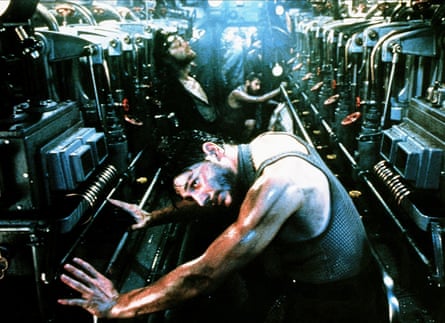The director Wolfgang Petersen set a new standard for claustrophobia in cinema with his international breakthrough movie Das Boot (1981). Taking place almost entirely on board a German submarine during the second world war, it is forensic in its detail, expert in its use of limited space, and eloquent in its anti-war message.
Petersen, who has died of pancreatic cancer aged 81, captured the tension and the tedium of the submariners’ lives together, and skilfully shaped episodes of extreme suspense, such as the attempt to escape sonic detection, which pushes the vessel further into the ocean’s depths until the metal groans and the rivets pop. He was alert to what he called “the terrors of silence, which can be even more effective than the loudest sound effect in the world”.
An adaptation of Lothar-Günther Buchheim’s mammoth 1973 novel, which drew on the author’s own experiences on a U-boat, Das Boot was first released in a 149-minute version. It earned six Oscar nominations including two for Petersen in the categories of best director and best adapted screenplay. A 300-minute television edit followed several years later, shown in instalments in Britain and Germany. Finally, Petersen pieced together the 209-minute Das Boot: The Director’s Cut, which played in cinemas in 1997.
He was back on the waves again for The Perfect Storm (2000), starring George Clooney and Mark Wahlberg as fishermen risking their lives at sea, and in Poseidon (2006), an ill-starred remake of The Poseidon Adventure, one of the rare times in his career when he appeared to be treading water.

But he was nothing if not versatile. The same levels of ingenuity and confidence were apparent whether he was presiding over the children’s fantasy The NeverEnding Story (1984), about a boy who enters the pages of a magical book, or the devilishly satisfying cat-and-mouse thriller In the Line of Fire (1993), starring Clint Eastwood as a Secret Service agent taunted by a psychopath played by John Malkovich. “Most thrillers these days are about stunts and action,” noted the critic Roger Ebert. “In the Line of Fire has a mind.”
The genial and boyish Petersen was an unashamedly commercial director who sought the largest possible audience and attracted many of Hollywood’s biggest stars. Dustin Hoffman and Rene Russo battle a deadly virus in Outbreak (1995), which features a memorably unsettling scene of germs being passed between coughing audience members in a darkened cinema; Harrison Ford plays a president whose plane is hijacked by a terrorist (Gary Oldman) in Air Force One (1997); Brad Pitt and Eric Bana clash swords and flex muscles in Troy (2004), a loose take on the Iliad that grossed nearly $500m. Whatever the genre, Petersen was driven by the same goal. “My passion is telling a story,” he said.
He was born in Emden, a German port town near the Dutch border. The son of a naval officer who later worked for a shipping company in Hamburg, Wolfgang was educated at the Gelehrtenschule des Johanneums in Hamburg, and developed an interest in film-making at an early age. He received a Super 8 camera for Christmas and had already shot an amateur western, in homage to his favourite film, High Noon, by the age of 14.
Even then, Hollywood was in his sights. “I wanted to tell these wonderful stories,” he said in 2001. “And if you start thinking like that, well, at the end of that dream stands Hollywood, because this is the most exciting place to make movies in the world.”

His earliest directing jobs were in theatre. He then enrolled at the German Film and Television Academy in Berlin. His graduation film, I Will Kill You, Wolf (1971), starring his first wife, Ursula Sieg, was broadcast on television, and soon he was directing episodes of the crime drama Tatort. He alternated between TV work and films, including the thriller One Or the Other (1974) and the sensitively directed gay love story The Consequence (1977). Both those films star his semi-regular collaborator Jürgen Prochnow, who went on to give a quietly magisterial performance as the submarine captain in Das Boot.
Following his Oscar nominations and the success of Das Boot, he was much in demand in Hollywood. He took over the allegorical science-fiction drama Enemy Mine (1985), about an unlikely friendship between a human soldier (Dennis Quaid) and his alien counterpart (Lou Gossett Jr) stranded on a distant planet, after the previous director, Richard Loncraine, was sacked. Petersen moved the shoot to the Bavaria studios in Munich, where he had made Das Boot, and ordered new sets to be built, among them a volcanic planet with multiple moons. He also commissioned new makeup designs for the alien character, which took five months to perfect. The resulting film, a costly flop, was fascinatingly strange.
The thriller Shattered (1991), which Petersen adapted from Richard Neely’s novel The Plastic Nightmare, stars Tom Berenger as a man piecing his life together after suffering amnesia following a car crash; Bob Hoskins’ colourful performance as a private detective provides some light and humour in a rather muddled, lurid affair.
Petersen returned to Germany to direct his final film, Four Against the Bank (2016), a breezy remake of his own 1976 TV heist caper, Vier gegen die Bank.
Das Boot continued to be regarded as his masterpiece. A 2019 television version, set after the events of the film, was announced by the production company via a tweet designed to forestall protests from fans of the original version: “New submarine. New crew. New story. We would not/will not ever remake the 1981 classic.”
He is survived by his second wife, Maria-Antoinette Borgel, and by a son, Daniel, from his first marriage, which ended in divorce in 1978, and two grandchildren.

Comments (…)
Sign in or create your Guardian account to join the discussion